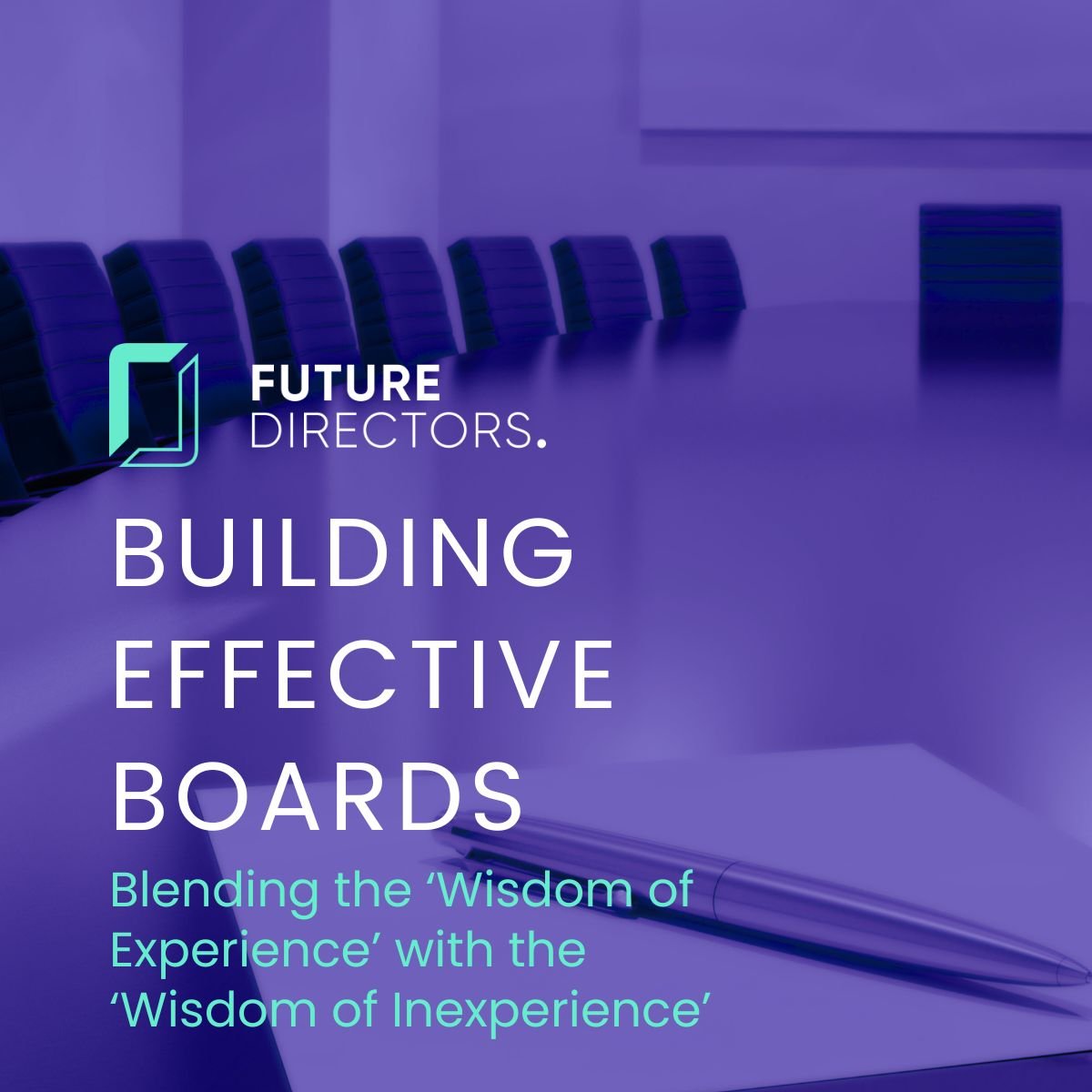Building Effective Boards: Blending the ‘Wisdom of Experience’ with the ‘Wisdom of Inexperience’
Sign up to receive articles like this in your inbox or join the Future Directors Hub to receive this and more.
Author Future Directors Founder Paul Smith
“Hey Paul, I’m in my early 30’s and want to sit on a board. Is this possible?”
“Hi Paul, you talk a lot about intergenerational diversity. What is it and how can we benefit as a board and company?”
“Hello Mr Smith, I don’t agree that young people should sit in the boardroom because they don’t have enough experience of corporate life to be able to cope with its complexities.”
These are typical of the correspondence I receive. Younger people asking whether they can make in the boardroom. Boards asking how they can benefit from the next generation. And, dissenters who believe that wisdom only comes from many years of real world experience in a business.
Before we dive into my responses, let me tell you my story. My first board role and exposure to that world came at the same time in my early 30’s. I’m was an executive for an publicly-traded investment company with several boards. I was also approached by an iconic but struggling charity to join their board.
As I enjoy a challenge I joined my first board and found myself in a room full of smart, credentialed and intelligent people from the business and conservation worlds. Unfortunately, there was no structure, no guidance, no strategy, no risk management. Whilst I hadn’t been trained, I instinctively knew that they lacked the basics of good governance.
I was chair of the board within a year.
At the same time, the chair of one of the public company boards I worked for was showing me all that was (and still is) wrong with the boardroom. Dominating meetings. Ignoring diverse views. Misaligned agendas and more. And this person was helping others get into the boardroom via their other company.
I wanted to change this and so set up the Future Directors Institute.
I share this to tell you that I have a vested interest in ensuring that all boards are fit for purpose and operating at peak performance. The impact that boards have on companies, communities and beyond cannot be understated. And, it doesn’t matter whether it’s a school, a charity, a private company or a large public corporation.
Do boards need to change?
This is the underlying question of this article. Do we actually have a problem that needs fixing? If we do, is part of the solution including younger voices in the boardroom?
My short answer is yes.
This is not to say that the concept of boards needs fixing. It’s also not to say that all boards need fixing. If we could objectively measure the performance of board (a deep topic I’m working hard on), we’d find a very broad range of results.
Most boards are homogenous. This means they are composed of the same type of person. It could be all male. All ex-CEOs. All financial and legal people. All owners. It could be all older ‘experienced’ professionals. It could be all single race or culture. Or similar education.
Homogenous boards will tend towards myopic decisions because they lack the input that differences of experiences bring, They will get it right some of the time, but it’s highly unlikely they would outperform a more diverse group over the longer term.
What we can say is this. The world is changing. It’s arguably more fluid and complex than ever before. So, boards need greater diversity in order to navigate these choppy waters. We are living in some of the most uncertain or volatile times and the ambiguity that we must accept in our decision-making is no more stark than from the boardroom.
The world, and the world of work, was changing before COVID-19. But this has been accelerated. How we communicate, how we access information (and misinformation), the motivations of business, ESG, customer preferences, worker rights, human rights, climate change, politics, mental health, poverty, hunger, war, resources…
It’s a lot.
In amongst that is the realisation that whilst much of what we are experiencing is history repeating itself, you could say that an equal volume of that experience is brand new and therefore we have no precedent to fall back on and consult.
And this is fundamentally what the title of this article alludes to; the blending the wisdom of experience with the wisdom of inexperience.
Blended wisdoms
The ‘wisdom of inexperience’ refers to the unique perspectives, ideas and insights that individuals who have limited experience in a particular field or industry can bring to the table. Inexperienced individuals are not constrained by past ways of thinking or entrenched beliefs. They can offer fresh and innovative perspectives that can challenge conventional wisdom and lead to new and creative solutions. The wisdom of inexperience is often characterised by a lack of biases, a willingness to take risks, and a tendency to think outside of the box.
Blending the wisdom of inexperience with the ‘wisdom of experience’ means combining these fresh perspectives with the insights and knowledge gained from many years of working through different economic cycles. By combining these two forms of wisdom, organisations can benefit from the best of both worlds, leveraging the tried and true practices of experienced individuals with the creativity and adaptability of inexperienced individuals.
In a rapidly changing world, this can lead to a more balanced and effective decision-making process, increasing the chances that you can overcome all challenges and capitalise on new opportunities. By combining the strengths of both experienced and inexperienced board members, organisations can create a more dynamic and future-focussed-thinking team, poised for success in a rapidly changing world.
Is it as simple as adding younger people?
It’s not about just adding younger people. Boards can add people from different backgrounds, cultures, education, skillsets, gender and more. But, before you rush to diversify your board, remember this fundamental rule.
There is no such thing as the ideal board.
There is such a thing as fit for purpose. Don’t follow the herd, follow what your company needs based on your industry, stakeholders, opportunities, regulatory environments etc.
But we are hear to talk about the next generation, so let’s explore the perceived benefits of adding younger people to your board of directors.
For context, the average age of boards in most countries is 60 years old. In fact, PwC has defines ‘board young’ as anyone under the age of 50. So, when we talk about younger people, we aren’t just talking about people in their 20’s or 30’s - although we aren’t excluding them either.
Representation of the younger demographic: Having younger people on the board can provide a perspective that represents the views and interests of younger generations. However, a word of warning. A single person does not represent everyone in their generation, but they will have a closer alignment.
Digital literacy & technology expertise: Younger professionals may bring a higher level of expertise and familiarity with technology and digital trends, which can be important in an increasingly tech-focused world. I was 20 when I got my first mobile phone. Now, my 9 year old son knows more about his iPad than I do.
Fresh ideas & innovative thinking: Younger people may bring new and creative ideas to the table, challenging traditional ways of thinking and leading to new solutions. There’s a story of a UK company developing a shadow board of younger employees who were given all the same information as the main board for the year. They outperformed their senior peers for strategic ideas - although they underperformed on risk management. This proved that a blended approach would work for them.
Adaptability & resilience: I would have said this before COVID, but I’d be stronger in my view now. Younger generations have grown up in this rapidly changing world and have developed the ability to adapt to new circumstances, bringing a more flexible and resilient perspective to the board. This may give them a greater sense of equanimity in a crisis than their peers who fear history repeating itself.
Strong work ethic & energy: Younger people are often accused of being lazy and entitled, but most I have worked with bring a high level of energy, enthusiasm and work ethic to the board, especially if it’s something they care deeply about. Imagine the dynamic conversations you could have if you opened yourself up to something different.
A word of caution
I mentioned before that the goal for board composition is ‘fit-for-purpose’ and I want to stress this when it comes to embracing new voices and ideas. Boards must put in the effort to truly understand their needs and the needs of all their stakeholders - from owners or shareholders to regulators, customers and employees. Once this has been done you can recruit younger directors that fit your specific needs.
The starting point that we use with our board clients is to either conduct a board healthcheck - a full ‘body’ scan of the performance of the board - which identifies strengths, weaknesses and priority areas for development. Or, we start with a skills matrix which looks at a board’s needs based on their strategic environment.
But, just like any new director, I implore you to ensure that you orientate and support them at every step of their journey so they can thrive in your boardroom. One mistake I’ve seen from too many boards recruiting diversity is that they’ve expected more from them than they do from others. It’s almost as if it’s an experiment that they wish to see fail.
Treat your younger directors with respect and like any director, seek to understand their motivations, the reasons for their perspectives and views. Embrace the potential difference rather than tick a diversity box.
This means building a board culture of inclusion.
My hope for the future
In conclusion, adding younger directors to your boardroom can bring a range of strategic benefits. By embracing diversity and inclusivity in all forms, including age, boards can stay ahead of the curve and remain innovative in their decision-making when confronted with our rapidly changing world.
However, it can be difficult to take a step out of a comfort zone and embrace new voices - perhaps ones that will differ to the existing voices - but the rewards are worth it when you create a culture that welcomes these views. Remember, they can also validate existing views.
The future really does belong to those who are willing to adapt, learn and change. In my experience with boards around the world, those that have embraced next generation thinking have taken a postive step forward for their companies.
My hope for the future is that boardrooms become truly ‘fit-for-purpose’, inclusive and innovative cultures where robust decisions are made because they embrace more diverse voices, inside and outside the company. This is a future where decision-making is grounded in a commitment to making a positive impact on communities, countries and the world.
I hope this is a future we can all look forward to and embrace.
JOIN THE FUTURE DIRECTORS HUB
For a community full of governance insights, courses, resources & more
Create a free account on the Future Directors Hub for articles like this, regular events and explore other resources.




